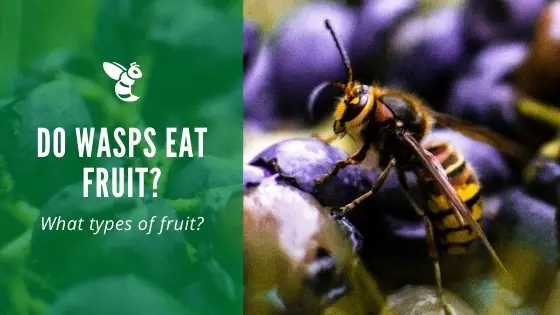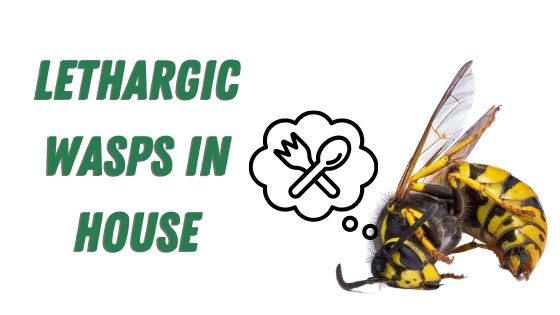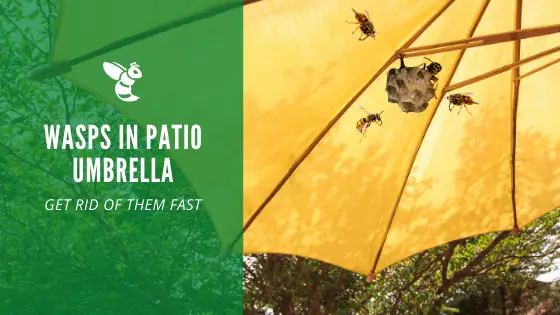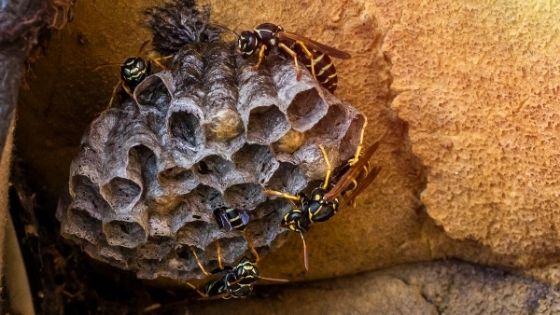Do Wasps Eat Fruit?

Summer is the time of year when you go outside, enjoy the fresh air, and may pick some fresh fruit from the orchard. But a picnic can quickly be ruined when a certain yellow and black insect shows up ready to sting. You may have noticed that fruit can attract wasps, much to the frustration of outdoor diners. But do they eat the fruit? If so, how?
Wasps do eat fruit. The high sugar content and ready access that many fruits provide is a siren’s call for wasps. They can eat other food, but the wasps shift their focus to chowing down on sweet, soft fruits when the fruit gets ripe. Some wasps can gorge themselves so much on fermented fruit that they become drunk!
What Fruits Do Wasps Eat?
The main thing that attracts social wasp species like the yellowjacket, paper wasp, and bald faced hornet to fruit is the sugar content. Solitary wasp species like the mud dauber wasp enjoy nectar but do not typically consume fruit.
Like bees, wasps crave sweetness and will seek it out. As such, wasps look for fruit that has a lot of available fructose. Wasps will eat any fruit that is available (as long as it is sweet enough), but their favorites include:
- Blackberries
- Sliced apples
- Oranges
- Bananas
Wasps have a particular taste for fermented fruit. During fermentation, the sugar content of the fruit increases. This makes it easier to detect and tastier for the wasps.
How Do Wasps Eat Fruit?
If you have seen a close up of the head of a wasp, you will have noted its large mandibles. Wasps have strong chewing mouthparts that they employ for a variety of uses. Certain wasps will chew up wood matter and use it to make their nests. Insects like the hornet will occasionally use their mandibles to strip the bark from trees and drink the sap found underneath. Others will use these mouthparts to chew through the soft insect bodies of their prey.
These same mandibles are what allow wasps to eat fruit. The strength of their mouths can mulch small bites of fruit, making it easy to digest. And when wasps go after fermented fruit, these fruits are often softer and more manageable for their bodies to process, leading to a feast for the wasps.
Wasps may not be able to munch through the thick rinds or shells of some plants, but soft fruits are nothing to them. Fruits that have been cut open and left outside are easy targets for wasps, as the hard work of reaching the fleshy insides of the fruit has already been done.
Do Lemons Deter Wasps?
At this point, you may be wondering what you can do to keep wasps away from your orchard or backyard! Fortunately, there are a few easy solutions to the wasp problem.
Lemons have developed a reputation for being able to deal with pests. While this may seem counterintuitive, as lemons are a fruit, lemon orchards do not have the same problems with wasp infestation that other fruit trees do! You can also combine them with other ingredients to make more effective wasp repellents.
To create a simple wasp deterrent, slice a lemon in half. Then place some cloves into the flesh of the fruit. That’s it! The smell of the lemon is not as appealing as other fruits, and the cloves’ smell will deter insects. The lemon’s acid can help activate the cloves even further, intensifying the effect by combining the two.
What Are Fig Wasps?
Everyone loves a creamy center in their favorite treat, but you may not expect a surprise in your figs! A certain type of wasp, known as a fig wasp, loves the fruit so much that its life cycle starts and finishes in this fruit. To many wild animals, an insect in a fruit can be an added bonus, but you probably do not like the thought of a bug crawling around in the fruit that you are eating.
Fig wasps are born within the fig fruit itself. Males live their entire lives in the fig, but females will leave after mating with their siblings to find a fresh fruit to lay their eggs in. Once they find a flowering fig, the female crawls in through the very end of the fruit. This process will rip her wings and antennae off, but she will not need them anymore.
The female will lay her eggs and die; her life has fulfilled its purpose.
This may seem like a gross bug that ruins our fruit trees; the truth is actually the opposite. Fig wasps fulfill the necessary requirements for a fig to grow into a fruit. The wasp brings with her pollen, which fertilizes the flower and makes it swell into a delicious fig.
How to Get Rid of Wasps
If the lemon solution does not work, you can still try other ways to cut down on the number of wasps in your backyard this summer. The most important thing to keep in mind is that wasps are drawn to where they can find easy food.
Wasps have a fairly broad diet, so it can be hard to remove each of their food sources. Wasps will eat other insects, fruit, wood, honey, and honeydew. Once you figure out what food you are supplying to the wasps, you can eliminate that source of attraction.
Dispose of fruit scraps far away from your house. You can also use sealed trash containers to make sure the smell of rotting fruit does not attract the wasps. Try to get rid of any sugar that may attract wasps out in the open. This includes sugary drink spills and leftover food.
If wasps have already set up an active nest on your property, you may attempt to remove the nest yourself safely, but this can be challenging. Wasps and hornets are typically inactive at night, so this is the best time to apply safe wasp nest removal strategies.
If your wasp or hornet problem is too challenging, it is best to call a professional to deal with these stinging insects. While wasp stings are not life-threatening in most cases, if you have an unknown allergy to the toxin present in a sting, you could be in real danger.
Conclusion
Wasps and fruit are joined by the everlasting forces of nature. Wasps will always be drawn to the sugary nectar that fruits hold, and some fruits even need wasps to survive! If you are worried about harmful wasps damaging your fruit trees, try using some lemon and cloves to deter them. Always secure your fruit scraps to remove a source of wasp attraction, and call a professional if you have an infestation.



